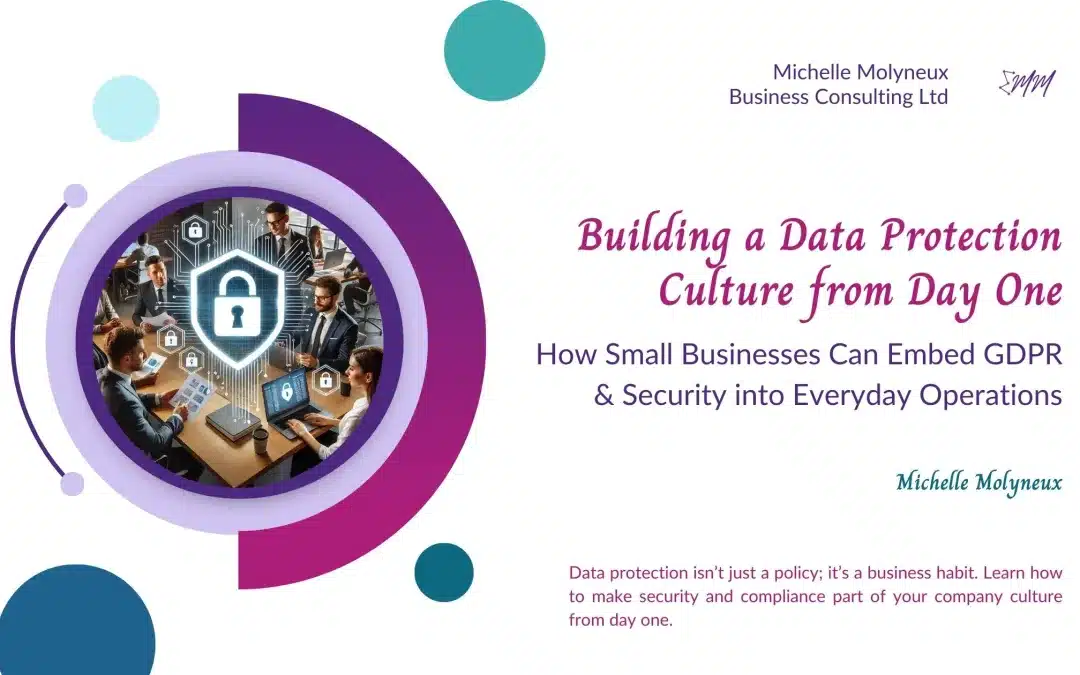How Small Businesses Can Embed GDPR & Security into Everyday Operations
When you think about an organisation’s culture, data protection probably isn’t the first thing that comes to mind. But, embedding GDPR and security into daily operations from the start can save you from costly mistakes later.
Many small businesses view data protection as a compliance tick-box rather than a core business value. The result? Data incidents and breaches, poor customer trust, and even legal penalties.
But here’s the thing—when data protection is part of your business culture, it becomes second nature. Instead of being a last-minute worry, it’s built into how your team works daily.
We will show you:
✅ Why embedding a data protection culture is crucial for small businesses
✅ How to make GDPR and security second nature in your team
✅ Simple steps to get started—without adding more work to your plate
Let’s make data protection easy and intuitive—so your business stays secure, compliant, and trusted from day one. 🚀
1. Why a Data Protection Culture Matters for Small Businesses
It’s easy to think of data protection as something you only need to worry about in legal documents. But the truth is that how your team handles personal data daily has a more significant impact than policies alone.
💡 Consider This:
- A customer emails their details, and a team member accidentally forwards it outside the company.
- A freelancer downloads sensitive client files onto a personal (unsecured) device.
- A marketing assistant adds customers to a mailing list without their consent.
👉 These are small, everyday mistakes that can lead to big problems.
A strong data protection culture ensures that everyone, no matter their role, understands the risks and follows best practices without hesitation.
💡 Real-World Example: A UK charity was fined £100,000 after staff accidentally shared sensitive data. The ICO found that a lack of training and awareness was the root cause. A better data protection culture could have prevented it!
To understand your legal obligations, the ICO’s SME Data Protection Guide provides clear steps for small businesses to follow
2. How to Embed Data Protection into Your Business Culture
Want to make data protection second nature in your business? Here’s how:
📌 Lead by Example
If business owners and managers don’t take data protection seriously, neither will the team.
✅ Show that data protection isn’t just a legal thing—it’s a business priority.
✅ Follow best practices yourself—use strong passwords, secure devices, and GDPR-compliant processes.
💡 Quick Win: Mention data protection regularly in team meetings so it stays on everyone’s radar.
For practical cybersecurity steps tailored for small businesses, check out the NCSC’s Small Business Cyber Security Guide.
📌 Make Data Protection Part of Onboarding
Training shouldn’t just happen after a mistake is made. New team members should learn about data protection from day one.
✅ Include data security basics in your onboarding checklist.
✅ Make sure freelancers, VAs, and contractors understand your data handling rules.
✅ Use real-life scenarios to teach how mistakes happen—and how to avoid them.
💡 Example: Instead of sending a long GDPR policy, create a quick “5 Key Data Protection Rules” guide for new starters.
📌 Keep Policies Simple & Accessible
Many businesses have great data protection policies, but they’re hidden in a document that no one reads.
✅ Make policies easy to find—store them in a shared folder or intranet.
✅ Write in plain English—avoid legal jargon.
✅ Create short checklists or infographics for key processes (like handling customer data).
💡 Quick Fix: Have a 1-page “Data Protection Do’s & Don’ts” guide that’s easy to follow.
📌 Encourage a “Speak Up” Culture
Data protection mistakes happen constantly—but many employees are afraid to report them.
✅ Encourage openness—let your team know that mistakes should be reported, not hidden.
✅ Make sure there’s a straightforward, blame-free process for handling data incidents.
✅ Celebrate good data protection habits—not just GDPR compliance!
💡 Example: A “Data Protection Champion” in your team can answer questions and keep best practices front of mind.
📌 Automate & Secure Data Handling
One of the best ways to make data protection part of daily business is to automate security wherever possible.
✅ Use secure password managers instead of shared spreadsheets.
✅ Set up automated email encryption for sensitive data.
✅ Enable multi-factor authentication (MFA) on business accounts.
💡 Pro Tip: Automating security reduces human error, making compliance much easier!
3. Making Data Protection Second Nature in Your Business
Here’s a simple checklist to help you embed a data protection culture from day one:
✅ Do I lead by example in following GDPR best practices?
✅ Is data protection included in onboarding for new hires & freelancers?
✅ Are policies simple, accessible, and easy to understand?
✅ Does my team feel comfortable reporting mistakes?
✅ Am I using automation to reduce security risks?
💡 If you answered ‘No’ to any of these, it’s time to strengthen your data protection culture!
Final Thoughts: Make Data Protection a Habit, Not a Hassle
Building a data protection culture doesn’t mean adding extra work—it’s about making security a normal part of your business’s operation.
✅ Start small. Make data protection part of conversations and daily habits.
✅ Keep it simple. Don’t overwhelm your team with complex policies.
✅ Stay proactive. Prevent mistakes before they happen.
Need help embedding a strong data protection culture in your business? We make GDPR compliance simple and practical for small businesses.

